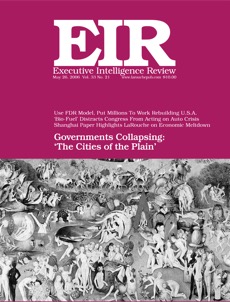The Governments Are Collapsing: The Cities of the Plain
by Lyndon H. LaRouche, Jr.
During the second quarter of 2006, entire chunks of the world became subjects of an accelerating pattern of collapse among governments, notably in the United States and Europe. “To understand the direction this present pandemic among the systems of today’s world is taking, it is useful to think of this situation poetically, as a crisis of a modern Cities of the Plain. At root, when the cause for this pattern is taken into account, this is a moral crisis of the relevant current cultures. The world is presently at the end of an entire era of post-World War II world history.”
Trans-Atlantic Powers in Free-Fall: George W. Bush and Other ‘Failed States’
by Jeffrey Steinberg
The Financial Bubbles Are About To Burst
Blair Joins Bush: The Lamest of Ducks
by Dean Andromidas
France: Economic Crisis Causes Government Implosion
by Christine Bierre
Italy: Will Prodi Take ‘Left’ Road to Disaster?
by Claudio Celani
Germany Is No ‘Island of Stability’
by Rainer Apel
Economics
The FDR Model From 1933: Put Millions To Work Rebuilding the Nation
by Marcia Merry Baker and Edward Spannaus
The agency structures exist, with enabling legislation already passed, which would allow us to immediately absorb millions of Americans, particularly unemployed and underemployed youth, into useful jobs building, repairing, and maintaining all manner of infrastructure, public works, and public health projects.
History of the Army Corps of Engineers
From the official “Brief History” of the Corps, which shows its indispensable role in infrastructure development and nation-building.
Report from Ground Zero: Housing Bubble Is ‘Dead Man Walking’
by L. Wolfe
France’s Inland Water Transport: Abolish Short-Term Thinking!
by Karel Vereycken
A programmatic report for the campaign of Jacques Cheminade, 2007 Presidential candidate of the Solidarity and Progress party in France.
National
Cornball Brothers on The Hill: CEOs’ Bio-Fuel Comedy Distracts Congress
by Paul Gallagher
From Auto Crisis Action The “Big Three” auto CEOs came to Capitol Hill to ignore the crisis of low-wage jobs and vanishing machine-tool capacity, and instead pushed “flex-fuel” fakery.
IAM President to Congress: Save Manufacturing!
Rogers Tours Texas To Bring Democrats ‘Out of the Bushes, Into the Future’
by Nancy Spannaus
George Shultz Pushes Next ‘Preventive War’
by Michele Steinberg and Roger Moore
Congressional Closeup
by Carl Osgood
International
Shanghai Paper Highlights LaRouche on Global Crisis
by William Jones
Under the title “He Ran for President Seven Times and Continues To Say Astonishing Things,” the daily Wen Hui Bao published its interview with Lyndon LaRouche, on the same day that the foreign ministers of the Shanghai Cooperation Organization (SCO) convened in that Chinese city.
Rise of Maoists in India: A Side-Effect of Globalization?
by Ramtanu Maitra
LaRouche in Berlin: ‘We’re Marching Down the Road That Leads to Victory’
by Lyndon H. LaRouche, Jr.
From a LaRouche Youth Movement cadre school in Berlin, Germany.
International Intelligence
Investigation
Italian Experts Insist: A Foreign Intelligence Service Killed Aldo Moro
by Claudio Celani
Claudio Celani reports on a conference held near Rome, titled “The Moro Case Among Doubts and Truth, 28 Years Later.” In the words of one of the speakers, the gathering was aimed at keeping alive the memory of the “gravest terrorist act in Italian post-war history,” and preventing “the game from being called off” on the fight for the truth about the 1978 kidnapping and murder of former Italian Prime Minister Aldo Moro.
Editorial
Crisis Requires Emergency Action by Congress



